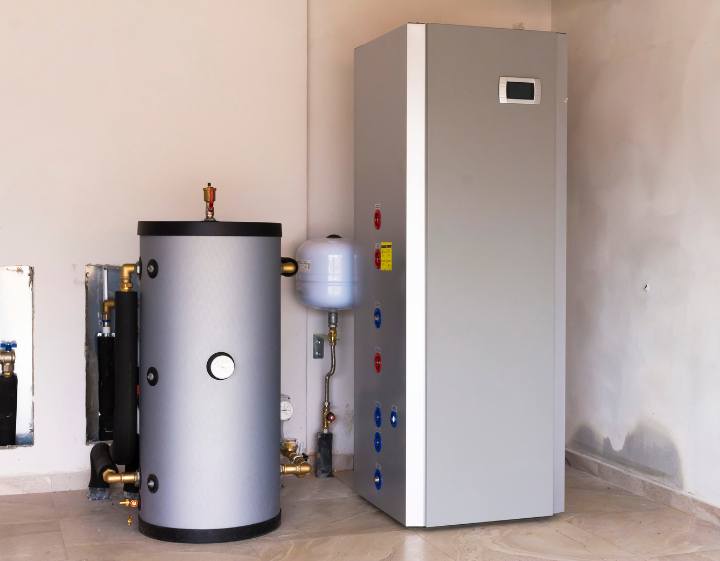Introduction
A condensing water heater is a cutting-edge technology that has revolutionized the way we heat water in our homes. Unlike traditional water heaters, which rely on a vent system to release waste gases into the atmosphere, condensing water heaters are designed to capture and utilize this waste heat, making them significantly more efficient.
In recent years, condensing water heaters have been gaining traction in the market, primarily due to their impressive energy efficiency and sustainable features. By using the waste heat that would otherwise be lost, condensing water heaters can achieve a remarkable energy efficiency rating of up to 98%. This means that they convert nearly all the fuel they consume into usable hot water, resulting in substantial energy savings for homeowners. Furthermore, condensing water heaters have a positive environmental impact. By capturing and reusing waste heat, they reduce greenhouse gas emissions, making them an eco-friendly choice for environmentally conscious homeowners. Additionally, their high efficiency also reduces energy consumption, further contributing to a greener future.
Considering the increasing popularity of condensing water heaters and their remarkable energy efficiency, cost-effectiveness, and positive environmental impact, it is no wonder that more and more homeowners are opting for this innovative technology as their preferred choice for hot water heating. By making an informed decision to invest in a condensing water heater, homeowners can not only save on their energy bills but also play their part in preserving our planet’s resources.
1: Enhanced Energy Efficiency
Condensing water heaters offer enhanced energy efficiency compared to traditional water heaters. This is achieved through the use of condensing technology, which allows these water heaters to capture heat from exhaust gases.
The process begins when the fuel is burned to heat the water in the tank. In traditional water heaters, the hot exhaust gases are released into the atmosphere, wasting valuable heat energy. However, condensing water heaters have a secondary heat exchanger that is designed to extract and capture this heat from the exhaust gases. By utilizing this captured heat, condensing water heaters are able to achieve higher efficiency levels. They can reach efficiencies of up to 98%, significantly surpassing the average efficiency of traditional water heaters which typically range from 70% to 80%. This means that for the same amount of fuel input, condensing water heaters can provide more hot water, resulting in energy and cost savings. Not only do condensing water heaters offer improved energy efficiency, but they also have a positive environmental impact. By capturing heat that would otherwise go to waste, they reduce greenhouse gas emissions and contribute to a more sustainable future.
Condensing water heaters offer enhanced energy efficiency by capturing heat from exhaust gases. They provide potential energy savings and cost-effectiveness, making them a smart choice for homeowners looking to improve their home energy solutions. Additionally, their positive environmental impact makes them a greener option for those concerned about reducing their carbon footprint.
2: Lower Operating Costs
One of the significant advantages of condensing water heaters is their ability to lower operating costs. These innovative water heaters offer increased efficiency compared to traditional models, resulting in reduced fuel consumption and ultimately lower utility bills.
Condensing water heaters achieve higher efficiency by utilizing advanced technology that captures and utilizes heat from the flue gases. Unlike conventional water heaters that simply vent the flue gases outdoors, condensing units take advantage of this wasted heat energy. By extracting heat from the flue gases, condensing water heaters can achieve efficiency ratings of up to 98%. This means that nearly all of the fuel consumed is converted into usable heat. The increased efficiency of condensing water heaters directly translates to lower fuel consumption and, subsequently, reduced operating costs over the lifespan of the unit. Homeowners can expect to see significant savings on their utility bills, especially when compared to less efficient water heater models. While the initial cost of condensing water heaters may be higher than traditional models, the long-term savings on operating costs can outweigh the initial investment. Additionally, many utility companies offer rebates or incentives for homeowners who choose energy-efficient appliances, further reducing the overall cost.
Opting for a condensing water heater can lead to significant cost savings on utility bills due to their increased efficiency and lower fuel consumption. Homeowners can enjoy the benefits of reduced operating costs while also contributing to a greener and more sustainable future.
3: Environmental Impact
One of the most significant advantages of condensing water heaters is their positive environmental impact. By using less energy than traditional water heaters, condensing models help reduce the home’s overall carbon footprint.
Traditional water heaters consume a significant amount of energy, and their inefficient operation leads to excessive greenhouse gas emissions. In contrast, condensing water heaters are designed to maximize energy efficiency by extracting heat from flue gases that would typically escape. This process not only reduces energy consumption but also minimizes carbon dioxide emissions. Furthermore, condensing water heaters often come with additional eco-friendly features. For example, some models incorporate low-NOx burners, which reduce nitrogen oxide emissions, a known contributor to air pollution and smog. By choosing a condensing water heater, homeowners can actively contribute to improving air quality and reducing their impact on the environment.
Condensing water heaters offer a compelling environmental advantage compared to traditional water heaters. By lowering energy consumption and incorporating eco-friendly features, these water heaters play a crucial role in reducing carbon emissions and promoting a more sustainable future. Therefore, homeowners who prioritize environmental responsibility should seriously consider the benefits of condensing water heaters for their home energy solutions.
4: Longer Lifespan
Condensing water heaters offer homeowners a range of benefits, and one significant advantage is their extended lifespan compared to traditional models. The design and operation of these innovative systems contribute to their durability, ensuring reliable and long-lasting performance. Furthermore, proper maintenance plays a pivotal role in maximizing their efficiency and prolonging their operational life. Condensing water heaters are typically crafted using high-quality stainless steel materials. This robust construction enhances their resistance to corrosion, thereby protecting the internal components from damage caused by rust or other environmental factors. The advanced heat exchanger technology employed in condensing water heaters ensures efficient heat transfer. By extracting and utilizing more heat from the combustion process, these systems achieve higher efficiency levels, reducing wear and tear on the overall unit. Modern condensing water heaters are equipped with sophisticated control systems that monitor and regulate various parameters, ensuring optimal performance. This intelligent operation minimizes strain on components and prevents excessive wear, extending the lifespan of the unit. Furthermore, to maintain optimal performance, occasional flushing and cleaning of condensing water heaters are necessary. This process helps remove debris or mineral buildup that could lead to reduced efficiency and potentially damage the unit over time. Moreover, professional inspections and servicing of condensing water heaters ensure that all components are functioning correctly. Timely identification and mitigation of any issues contribute to prolonged system lifespan and prevent costly repairs.
Condensing water heaters boast an impressive operational life, thanks to their durable construction and advanced technological features. When combined with regular maintenance, these systems can provide homeowners with reliable and efficient hot water for many years, making them a wise investment in terms of longevity and cost-effectiveness.
5: Greater Installation Flexibility
Condensing water heaters offer homeowners greater installation flexibility compared to traditional water heaters. One advantage is the advanced venting options available with these units, which allow for versatile installation within a home. Unlike conventional water heaters, condensing water heaters can be vented horizontally through an exterior wall or vertically through the roof. This flexibility means that homeowners can choose the most convenient and efficient location for the unit, whether it be in a basement, utility room, or even on an upper floor.
The ability to vent horizontally also eliminates the need for a traditional chimney, further expanding the options for installation. This is especially advantageous for homeowners who have limited space or do not want to sacrifice any existing storage or floor space for a water heater. Condensing water heaters are designed to be compact and can be wall-mounted, freeing up valuable square footage in smaller homes or apartments. In addition to their space-saving benefits, condensing water heaters offer greater installation flexibility, allowing homeowners to make the optimal choice for their specific needs. Whether it’s the versatility of venting options or the compact design, these advantages make condensing water heaters an attractive option for homeowners seeking efficient and space-saving solutions.
Choosing the Right Condensing Water Heater
Choosing the right condensing water heater for your home is essential to ensure efficiency, cost-effectiveness, and long-term satisfaction. There are a few factors to consider when sizing and selecting the perfect model for your specific needs.
Firstly, determine the peak demand for hot water in your household. Consider the number of occupants, bathrooms, and appliances that require hot water. This will help you calculate the appropriate size and capacity of the water heater. Next, evaluate the energy efficiency ratings of different models. Look for units with a high Energy Factor (EF) and a good Uniform Energy Factor (UEF). These ratings indicate the heater’s efficiency in converting energy into hot water and its ability to sustain that efficiency over time. Additionally, consider the fuel source available in your area. Condensing water heaters can use natural gas, propane, or electricity. Choose the option that is readily available and cost-effective for your region. Lastly, consult with a professional. A trained technician can assess your home’s requirements accurately and recommend the best condensing water heater for your needs. They will also ensure proper installation, which is crucial for optimal performance and safety.
Choosing the right condensing water heater requires careful consideration of your household’s hot water demand, energy efficiency ratings, fuel source availability, and consultation with a professional. By making an informed decision, you can enjoy the significant advantages of condensing water heaters – efficiency, cost-effectiveness, and positive environmental impact – for years to come.
Conclusion
The use of condensing water heaters in homes offers a wide range of benefits that homeowners should consider when replacing or upgrading their water heating system. These energy-efficient appliances provide significant advantages in terms of efficiency, cost-effectiveness, and positive environmental impact.
By recirculating heat from the flue gases, condensing water heaters can achieve efficiency levels of up to 98%, leading to substantial energy savings and lower utility bills. Their advanced technology also allows for improved heat recovery and faster hot water delivery, ensuring a constant and reliable supply of hot water for households. Furthermore, the cost-effectiveness of condensing water heaters is notable, as their higher upfront cost is offset by long-term energy savings. With lower operating costs and a longer lifespan compared to traditional water heaters, homeowners can expect a return on their investment over time. Lastly, choosing a condensing water heater contributes to a positive environmental impact. These appliances produce significantly lower greenhouse gas emissions, reducing the carbon footprint of a home. By opting for this energy-efficient option, homeowners can actively contribute to the sustainability of our planet.
Overall, the installation of a condensing water heater is a wise choice that brings multiple benefits to homeowners. Its efficiency, cost-effectiveness, and positive environmental impact make it a compelling option for those seeking to optimize their home energy solutions.






